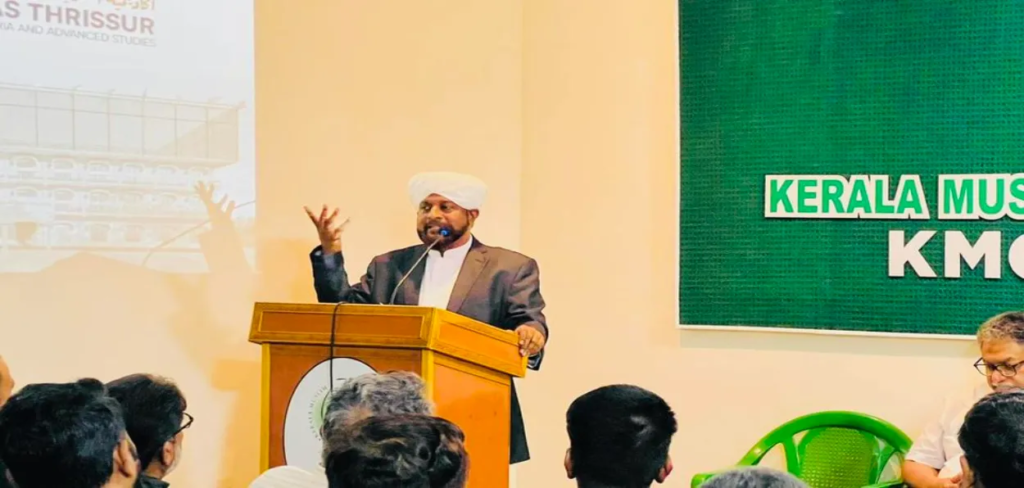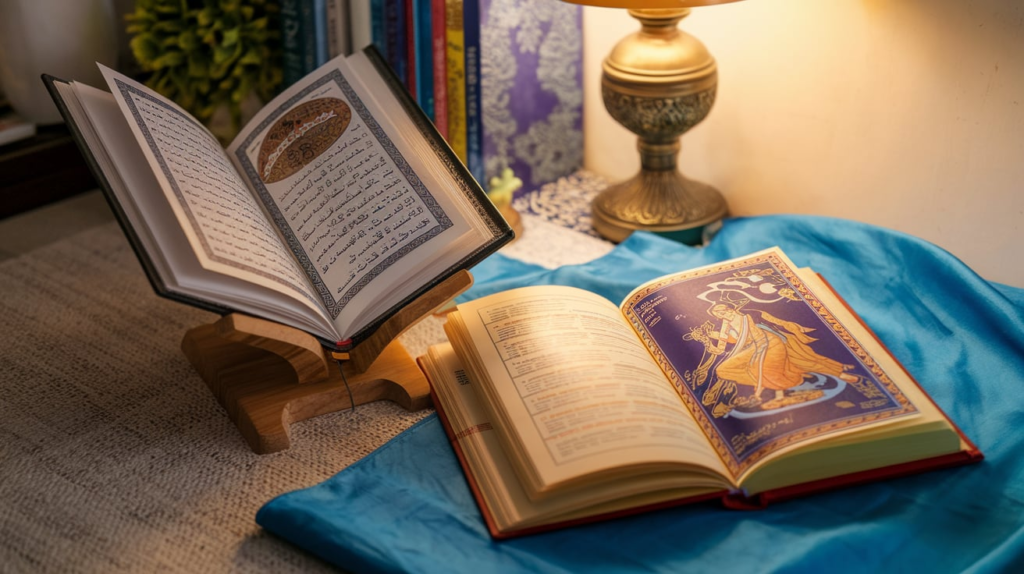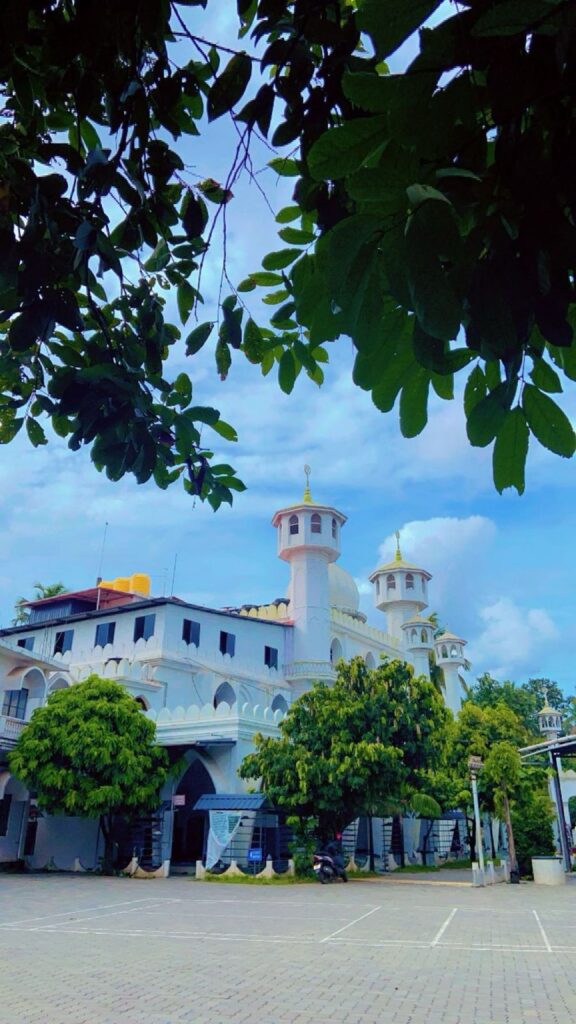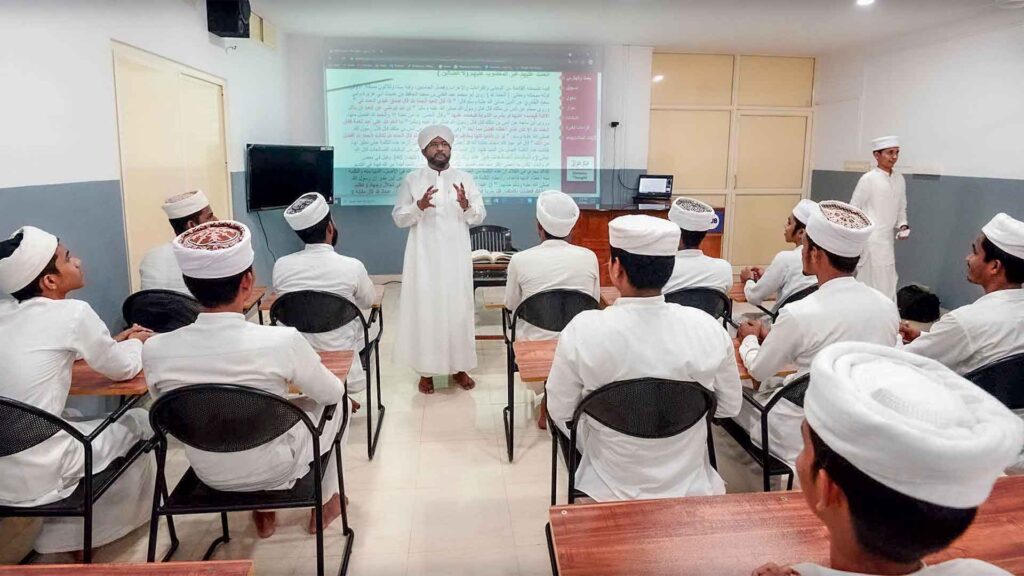Thrissur, KERALA :

Muhammad Faizy Onampilly teaching at Academy of Shariat and Advanced Studies
There are many educational institutions run by the Jamaat or other Muslim bodies all across the country. They go about their job teaching Islamic scripture, Islamic laws, Hadith, and so on.
The Academy of Shariat and Advanced Studies in Thrissur in Kerala (ASAS) in Thrissur in Kerala is however a bit different as its principal is a Sanskrit scholar from Sri Sankara University Kalady (the birthplace of Adi Sankaracharya) and it also teaches Sanskrit and Vedantic texts to its students along with Islamic texts.
Started eight years ago by Samastha, a body of Sufi Sunni Muslim scholars, and its curriculum was redesigned by its principal Onampilly Muammad Faizy to make it one of the most unique institutions in the country.
The principal introduced Sanskrit language and literature as a compulsory part of the curriculum a few years ago.
Students enter the academy after grade X through an entrance test. They complete their intermediate, degree, and post-graduation in Islamic studies and one of the papers is Sanskrit.
Why Sanskrit in an institution which teaches Islamic law? What is the relevance? Are there any takers? Is there no opposition?
There are many more questions but just one answer. “I want students to know everything and be aware of every philosophy and not be isolated,” says the principal.

The Holy Quran and Bhagwat Gita
OnampIlly is well known for his discourses which turn pages of Koran and Upanishads as if they were from a single book. His erudition in both Vedantic thought and the Quran is well known.
“The Indian philosophical scenario is vast and I want students at my Academy to know it and not be cut off from it,’’ he says.
His students at the Academy are about 100 in number. Asked if they or their parents had objections to learning Sanskrit, he said it is an academic subject like any other. I believe that you should learn and know every thought rather than be isolated and restricted to just your religion. Knowledge and awareness breeds understanding,” he says.
Though his talks (available on YouTube) are laced generously with quotes from the Gita and Upanishads, he does not teach Sanskrit at his Academy. “ I feel that the study of a language is also a study of the culture that it represents. So, while we learn a language we are also appreciating the culture of the people who speak it. So, I have three Hindu Sanskrit teachers to conduct the courses. This interaction removes the cultural barricade between the two. I would not be able to communicate the cultural subtleties as a Hindu teacher would be able to,”’ he says.
OnampIlly says the present education system lacks dharma or value-based education. “Without values education is hollow.’’
But given the diversity of religious faiths in India, schools shy away from including anything on religious philosophies in the curriculum. Asked about this he says that is no excuse to deprive students of the rich values that our faiths provide. If his academy can do it, why can’t the schools do it, is the unasked question.

Academy of Shariat and Advanced Studies in Thrissur in Kerala
Education is just a money-making exercise now. There is teaching of texts but no mentoring. Only if you mentor the child, you would expose him to the plurality of faiths and to the common principle that unites all faiths – compassion.
NEP was an opportunity to reform the education system but it failed to bring in any change, he says.
Unless students today are exposed to religion and value-based education, it is not possible to explain to them the beauty of plurality. They should know about differences while they keep their own identities, he says adding that without understanding and awareness, and differences can only lead to hatred and conflict.
He says that embracing plurality doesn’t mean discarding one’s own beliefs. I’m very rigid about my faith. Once I was asked to light a lamp at a function presided over by a Supreme Court judge I refused to do so. And then I told the gathering that even though my action looks shocking, the Constitution supports me in this, he says, adding that our education does not create awareness about even the Constitution.
He cites a Supreme Court verdict that said “Constitution and culture teach us harmony and let us not dilute it.”
The students here complete their UGC-affiliated degree and PG courses along with the Islamic studies courses provided at the Academy. The Sanskrit course is part of the eight-year Islamic Course. It starts with basic grammar,a few shlokas,and simple content at the intermediate level followed by Sanskrit plays at the degree level. In the final year and at the PG level, philosophy and an introduction to Puranas are included.
The main ten Upanishads which have Sankara’s commentaries are included for studies while Mundakopanishad is taught in detail, Abhishek, one of the Sanskrit teachers at ASAS to Awaz-the Voice.
At the PG level, students do a thesis which is usually a comparative study between Koran and Vedantic texts. Onampilly wants us to create an interest in the students as that will lead them to more self-study. The dissertation project also makes them explore texts on their own and stumble upon similarities while improving their analytical skills”.
Abhishek is a postgraduate from the Central Sanskrit University based in Delhi.
“The students are very talented and often point out to me similarities between Sanskrit philosophical content and Koran and other texts”, he says.
Abhishek who just completed his course from the Kerala campus of the CSU and in his first job here, then finds himself reading English translations of the Quranto find those similarities pointed out by students. “So, I’m learning a lot too,” he says.
“The principal himself knows most Sanskrit texts and wants his students also to be knowledgeable. This is something no institution branded as secular would dare to do,especially for all its students, and choose to keep them all in blissful ignorance of both their texts and those of other faiths, ‘’says Abhishek.

A class in progress at ASAS
“So that is our tradition. You keep your identity but accept the other too. By teaching Sanskrit, I’m only promoting this broader outlook among my students,” says OnampIlly.
His dream is to include the study of Syrian, Buddhist, and other streams of philosophy and religious thought in his academy. It may not be possible to do full-fledged courses but at least we can start with lectures and presentations to expose students to world religions and philosophies, he says adding that the most challenging task is to find teachers.
“I want to tell my students that there is a sea of human community around you and you don’t exist in isolation’’, he says.
He says that no other Islamic institution teaches Sanskrit texts or Sanskrit as a course as his academy does.
However, this initiative is done in a smaller way in another institution run by Samastha, the Sufi platform that started this academy. The Dar ul Huda an Islamic University in Chemmad in north Kerala, a deemed university also conducts short programmes on Sanskrit texts and to build awareness among students, says Onampally.
Asked about any resistance from non-Sufi bodies in Kerala, he said that the Jamaat and other Islamic bodies are moving towards openness. “So, I have not faced any objections from anyone so far’’. Besides the study of Sanskrit helps improve their study of their texts. Sanskrit influences Malayalam and we are all products of different influences. Society is all about give and take and so we can’t separate ourselves from other languages and other belief systems, he explains.
Asked about the obscurity of Sanskrit and the consequential ignorance of the philosophical content in Sanskrit even for Hindus, he quotes Ved Vyasa and says dharmasya tattvaṁ nihitaṁ guhāyāṁ mahājano yena gataḥ sa panthāḥ meaning that the dharma tattva or righteousness or the knowledge of the truth resides in a cave. So, walk where the wise men go and realize the right path through them.
source: http://www.awazthevoice.in / Awaz, The Voice / Home> Story / by Sreelatha Menon, Thrissur / November 04th, 2024








